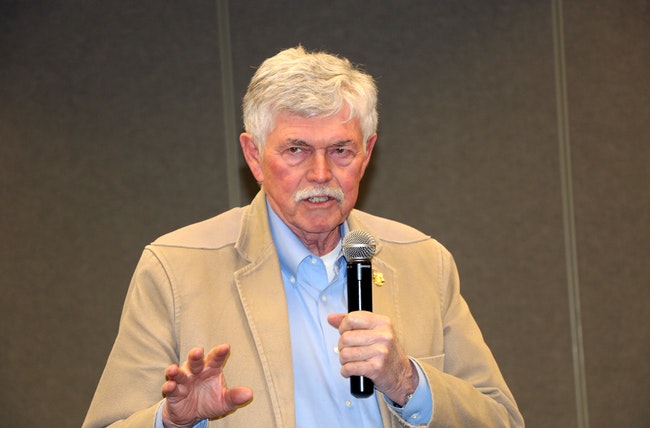
Ontario Mayor Riley Hill. (The Enterprise/Joe Siess)
ONTARIO – Riley Hill, a developer and the mayor of Ontario, has sued the city he leads in an effort to overturn a nuisance finding that resulted in a $500 penalty.
The lawsuit filed in Malheur County Circuit Court on Jan. 11 reads a bit like a political soap opera, with the mayor dealing with the city manager and police chief over his private holdings and then facing judgment by a city hearings officer who once ran against him.
The suit comes a year after an Ontario city code enforcement officer reported debris and weeds on an Ontario lot owned by Hill’s company, Eldorado Investments Inc., the company now suing the city.
The company asks in its suit that the city’s decision to impose a fine be overturned and that the company get back its legal costs and other expenses.
The court complaint suggests action against Hill was politically motivated, pushed by two former Ontario city councilors.
“In his political career, Mr. Hill has opposed wasteful spending by the city,” the complaint said. “In particular, he suggested limiting funding for ordinance officers, who are responsible for things like policing garage sales, stray animals, and parking.”
Hill didn’t respond to requests for comment.
The year-long saga now moving into a courtroom focuses on property at 1259 S.E. 11th Ave. in Ontario, a private lot with a mobile home that Hill’s company said in its lawsuit had been occupied by a squatter.
“This squatter admittedly left a mess in the yard,” the complaint said.
According to court filings, Hill complained to police about the squatter, prompting a visit to the lot by Officer Dallas Brockett of the Ontario Police Department.
At the property, Brockett observed multiple violations of Ontario city code, including debris, outside storage of personal property, odors, and storage of a motor vehicle. He issued a notice to Hill’s company on Jan. 23, giving the company until Feb. 6 to clear the violations.
The notice said that tall grass had to be cut and weeds sprayed. “Debris, junk, vehicle parts, human feces, garbage, personal items, furniture, trash, scrap and other items must be removed,” the notice said.
According to city records, Hill later testified that he had been unable to kick out the squatters who had made a mess of his property until going to court in “June or July.”
“Mr. Hill acknowledged that he was having conversations with the city manager and police chief between February and August as it related to the abatement, which explains as to why code enforcement was not more forcible in imposing penalties during this period of time, considering
Mr. Hill’s connections with the city,” according to the hearings officer’s later findings. “It was only after seven months of non-compliance that code enforcement, in consultation with the police chief, that a minimal civil penalty was assessed.”
The lawsuit said “two former city council members spurred the fines by agitating for police action against Mr. Hill” but didn’t identify the councilors. The lawsuit also said that the city enforcement officer had compiled a list of Hill’s properties and that the police chief – unnamed in the complaint but who is Steven Romero – “told Mr. Brockett to issue a fine on one of Mr. Hill’s properties.”
Romero didn’t respond Monday to a request for comment.
On Aug. 19, Officer Brocket issued Eldorado Investments a $600 fine – $500 for the continued presence of weeds on the lot and $100 for an abandoned car.
Eldorado appealed the fine, making its case to a city hearings officer, who acts in a quasi-judicial role in handling such administrative proceedings.
The hearings officer assigned the case was Billy Carter, himself a former city code enforcement officer and a candidate for mayor in 2018 in the race won by Hill. Hill took office in January 2019.
According to City Manager Adam Brown, Carter was the backup hearings officer, and was assigned to the case only after the first hearings officer, Mike Pratt, declined to be involved due to a business relationship with Hill.
The hearing was held on Nov. 12 and Brockett presented photos of the property taken the day of the hearing that Carter later wrote “showed that there were still noxious weeds and an abandoned vehicle on the property.”
Attorney Zach Olson, representing Hill’s company at the hearing, said that photos attached to the August citation “do not show a nuisance. Instead they show that the mess from the January notice had been cleaned up. All the trash, debris and weeds shown in the January notice were removed.”
Olson wouldn’t answer a question from the Enterprise about when the debris had been cleaned, and the lawsuit is unclear on that point.
In the lawsuit, Hill’s company noted that the hearings officer had been a political opponent of Hill’s.
“During the hearing, Mr. Carter repeated his campaign slogan that it was time to ‘make Ontario shine,’” the complaint said.
In issuing his decision, Carter said Hill’s allegations that city properties also had nuisance issues wasn’t relevant. He found Eldorado guilty of the violations and reset the fine to $500, leading to the recent lawsuit.
Hill’s company said the city’s effort was flawed in several ways.
Eldorado took issue, for instance, with the fact that the original abatement notice was sent using certified rather than first-class mail, in a violation of city code. The complaint said that Hill got a verbal warning from City Manager Adam Brown that was “not even timely” and constituted “vague second-hand oral notice…unsurprisingly not authorized in Ontario’s Municipal Code.”
Brown declined to comment on these allegations, citing the ongoing suit.
News tip? Contact reporter Liliana Frankel at [email protected] or 267-981-5577.
SUPPORT OUR VITAL LOCAL WORK: We provide Malheur County the local journalism that searches out the facts for you. SUBSCRIBE FOR $5/month. Click HERE.




